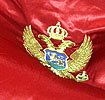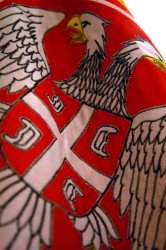

1. The grey zone: The European Union imposed a condition on the Montenegrin referendum procedure. Namely, in order for the independence vote to be successful 55% of those who vote will have to support this option. If the independence vote ends up being between 50% and 55%, Montenegro could legally not become independent but the factual situation will be such that more people voted for independence than for the joint state. Montenegrin government was not happy about this condition but was forced to accept it. The argument for imposing such qualified majority requirement was partially based on comparative legislature, partially on the conviction that deciding on the independence of a certain territory or administrative unit will have to be based on the support of the largest possible portion of the population in order to assure a stable and united future for the country, in both cases. Such condition, imposed by the EU, proved to be the right one, also because it managed to make all political options participate in the referendum procedure. Why is then the Djukanovic’s government insisting on the political construction of the grey zone? In this way Djukanovic is creating himself more space for political manoeuvring. He is threatening to severe Montenegro’s relations with Serbia and withdraw all Montenegrin political appointments and administrative staff from federal institutions. Simply, the Montenegrin government could continue to behave as if Montenegro were independent and ignore EU’s demands for the construction of a more functional federal state. This is, however, less likely. The grey zone is an escape goat for Djukanovic, in this way he has some chance of presenting himself as a winner in the referendum, at least until the September parliamentary elections. Winning less than 50% would mean an end of the political career of Milo Djukanovic, last of the old ex-Yugoslav, ex-Communist nomenclature.
2. High voter turnout: The higher the voter turnout, the more difficult will it be for Montenegro to go independent. Paradoxically, strong campaigning for independence will cause more people to vote regardless of their preference in terms of the future of the Montenegrin state. On the other hand, Djukanovic could not allow himself not to campaign. There were rumours (and some vide footage) that the government is temporarily buying off the identity cards from the members of the unionist block in order to prevent them from voting and in order to decrease the voter turnout, but it is rather uncertain that this illegal practices could have an important impact on the final exit of the vote. This time, there is a greatest number of registered voters in the democratic history of Montenegro. This is not a good sign for Djukanovic. Few will decide to do something else on the day of the elections, if the voter turnout reaches what now seems the impossible 90%, everything can happen. In this case even the impossible scenario in which the independence vote would remain below 50% remains an option.
3. We love you but we want to leave and be the masters of our own destiny: This is the winning formula for the Montenegrin independence and the Djukanovic’s political block is strongly using this political rhetoric. Namely, the vast majority of the Montenegrin population feels strongly related to Serbia and their common Serbian culture. Many Montenegrin citizens live and work in Serbia or have close business ties with Serbia. On the other hand, the bad memory of Milosevic’s years, the impression that the union with Serbia carried in itself a heavy price of the years of isolation, bad economic situation etc., makes many more prone to vote for independence. Yet, the fear of the severing of the relations between the two states in the case of Montenegrin independence might just make them opt for the joint state. It is for this reason that the tones in the independence campaign lately became more moderate, “we will go independence but everything will remain the same”, “when Montenegro becomes independent first foreign capital that I would visit would be Belgrade, said a Montenegrin foreign affairs minister”. Will everything remain the same? Probably yes, but people wonder. The fact that Djukanovic often used radical political rhetoric to support the independence option certainly did not help his cause.
4. Bosniak voters: Seemingly, the Bosniak Muslim population living in Montenegro will vote for independence. Djukanovic’s regime was always more tolerant towards minorities than Milosevic’s. While the Albanian minority in Montenegro will surely vote for independence, this is not so certain in the case of the Bosniaks. Bosniak political parties participating in the government at the national and local level in Serbia were actively involved in the campaign for the joint state and this can have an important political impact on the result of the Montenegrin referendum. Namely, the area in which the Bosniaks live, Sandzak, lies in the south-west of Serbia and in the north of Montenegro, splitting this region in two in the case of Montenegrin independence would certainly not favour the local business and personal relations (this is especially true in the case of initial cold inter-state relations between Serbia and Montenegro.
No comments:
Post a Comment